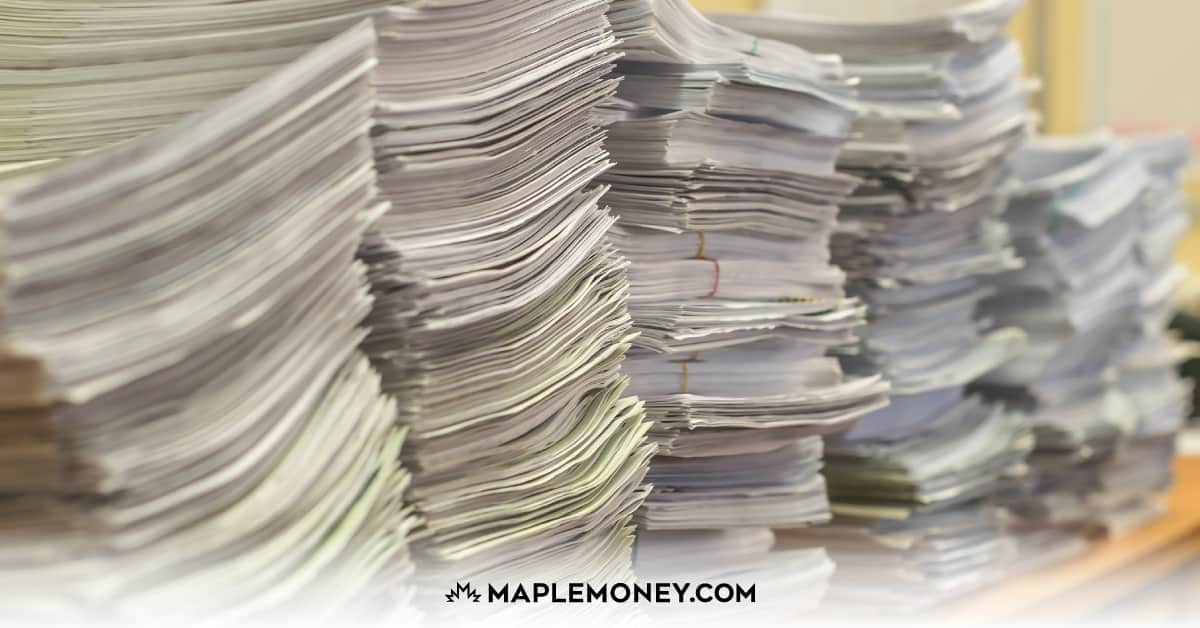How Long to Hold on to Financial Records in Canada

Is paper clutter taking over your home? Is it difficult to find important paperwork? Are you wondering just how long to hold on to financial records?
If so, you’re not alone. Many people have a problem with paper clutter. But just how long do you really need to hold on to it all?
Below is a list that you can use when dealing with all of the papers in your home.
1 Month
- Bank withdrawal and deposit slips: Check your bank statement to make sure the amounts match up and then shred.
- Receipts: Enter them into your monthly budget and then shred, unless you paid with a credit card. In that case, wait until your monthly statement arrives and double check that the amounts are correct. Then you can shred the receipt. Keep your receipt if you purchased something with a warranty (keep it until your warranty expires or you no longer own the item).
- Internet, Telephone & Utility Bills: Keep these for one month and then shred. If you own your own business and can write off these expenses, then you should keep the bills for 6 years.
1 Year
- Monthly Bank Statements: Keep these for 1 year, unless you have your own business, in which case you should hold on to them for 6 years.
- Monthly Brokerage/Mutual Fund Statements: Reconcile with your annual statement and then shred.
- Monthly Credit Card Statements: Keep these for 1 year, unless you have your own business and have purchased items with your credit card, then you would keep the statement for 6 years.
- Monthly Mortgage Statements: Reconcile with your annual statement and then shred.
- Pay Stubs: Reconcile with your T4 and then shred.
6 Years
- Tax Returns: Starting from the end of the tax year relating to the records.
- All T4 Forms: Starting from the end of the tax year relating to the records.
- Annual Mortgage Statements
- Receipts & Statements for Tax Returns, including: donations, RRSP contributions, child care receipts, mortgage interest, medical expenses, property tax payments, alimony/child support paid or received, etc. (Starting from the end of the tax year relating to the records.)
Forever
- Adoption Records
- Auto/Home/Life Insurance Policy Information: Keep as long as the policy is still active and then shred.
- Auto Records: Keep as long as you own the vehicle.
- Birth Certificate
- Death Certificate(s)
- Divorce Agreement/Child Custody Orders
- Investment Records
- Marriage Certificate
- Medical Records
- Military Records
- Pension Plan Records
- Receipts for major home improvements: Keep until you no longer own the home.
- Will and/or Power of Attorney
Store all of your financial paperwork in a cool, dry place.
We keep all of our monthly and forever files in a filing cabinet in our office. The paperwork that we need to hold on to for 6 years is in storage totes in our basement (it’s very dry down there and they are up off the ground). Extra important papers are locked in a safe.
Remember that if you do own your own business, you need to keep your business paperwork separate from your personal paperwork, to avoid hassles if you are audited.
How do you store your financial records?


Comments
I’d suggest photocopying or scanning any important receipts needed for warranty or tax purposes that have been printed on thermal paper as they have a tendency to fade over time.
travelgeek – Great suggestion! I plan to get a safe and keep all important documents in there, and then just photocopies in my filing cabinet.
Corporate records legally need to be kept for 7 years not 6 years according to Revenue Canada. I keep mine for 8 years just in case of an audit.
Actually, it is 6 years according to revenue canada. see below.
http://www.cra-arc.gc.ca/tx/ndvdls/tpcs/ncm-tx/kpng/menu-eng.html
BTW, I agree with most of Cassie’s article. But when in doubt, keep non-tax statements for 1 year, this will allow enough time to review any dubious charges.
But most company’s will send you a year or 2 worth of statements for a small fee anyways, I like having them do my bookkeeping!! 🙂
Thanks
N@ – Thanks for the clarification!
Spelling: indefinitely
Wow! You are a brave lady putting this online. There is a liability issue when you make these statements for public information.
People should check with their accountant for the latest information – and, no, I am not an accountant looking for business.
If you purchase something that has a warranty, you need to keep the receipt to be able to return, exchange or repair under the warranty.
Shirley Johnson: There are dozens of website articles with similar information online.
Kirsty: Good point, I will make a note of that.
Sad thing is I trust what Ms January posts online a lot more than anything I was ever told by the accountant I used for years. Some of them dont know what they are doing.(Of course many do! but check their qualifications, many have only taken a couple courses and then claim to be an accountant!) THis one in particular that Im refering to knows very well how to scam the system so they pay little to no taxes.
I personally dont see how Ms January could be liable for what she post on her personal blogs, quite frankly if a self employed and or buisness owner didnt get all the details straight from the Government than they are responsible. Just my thoughts anyways.. Thanks N@ for updating the blog with the correct amount of time !! THanks everyone for the other comments, some great ones!!
Thank you for this information. Also a tip – keep your SIN, Birth Certificate, Marriage Licence, Wills, Passports and anything else extremely important in your safe (if you have one).
I disagree 100% on the utilities….. Bell has a bad habit of billing 2-5 months later for on-demand movies…. there has been more than one occassion I have had to bring out an old bill to show I had previously paid. The electric company also loves to change their monthly payment agreements based on “previous usage”. You can’t fight it unless you have your bills. Also, Telus once charged me a different fee and since my contract was about 3 years old, it certainly helped to have those past bills!
I needed totals for Disability premiums paid at work and the only way to get the totals were off each pay stubs, I had kept my lifetime pay stubs, it put more than $2,000 back in my pocket at tax-time when I was able to deduct the premiums paid from Long term disability after some surgery. The premiums were deductible back to something like 1965.
Great list of dates and thoughts. Over the last two years, I’ve been scanning everything (including all my old CRA records) for both my business and personal financial documents.
The Fujitsu ScanSnap 1500 (Mac or PC model) is amazing. It makes short work of all my paperwork. I’ve managed (with help from some temps) to divest myself of about 6 large (and full) filing cabinet drawers. Everything is now in PDF format and on my laptop (with two separate backup drives!) – accessible any time and place that I want it.
It has been a big project, but the results are amazing. And so easy to keep up each month when paperwork or now often online statements arrive.
I have kept ALL bills paid with payment tickets going back to 2000.
Is this unnecessary?
I am not a business, it is my personal bills.
Should I get rid of some years?
Yes, you can get rid of most of it. Just make sure to keep the important stuff, which is noted on this list.
I still have all the application forms for my student line of credit, and each time we applied for more credit. It’s been closed for a few years now and I’m still working on paying it down. I have online statements for all the payments I’m making, etc., but do I still need all these applications?
some explanation or examples of why would be nice.
Thanks so much. Very helpful. I have changed banks and don’t need/want my old bank statements as I have no money left in there. I do keep my visa statements as they have purchases on there that could be used of I couldn’t find my original statement.
I just scan my old bills, shred the originals, but most i get are digital now anyway, i just keep a spreadsheet of the conf #and amount that i payed from teh bank and thats it less clutter….baclk up the files to USB and done
Define Investment records that need to be kept forever.
I am an employee who is reimbursed for expenses while working. Most receipts are scanned and uploaded to my company for payment (low value receipts are not).
What type of retention policy should I have for these receipts?
Hello,
Thank for the article. I have a question about the point that talks about keeping credit card statements for a year. Is there legislation in Canada that states that? If so, what is the act of legislation?